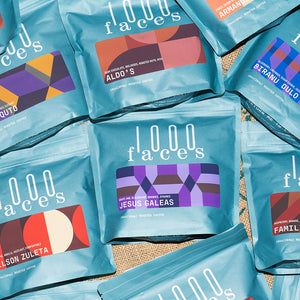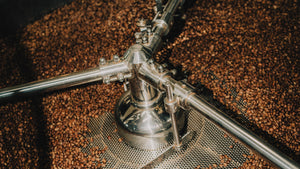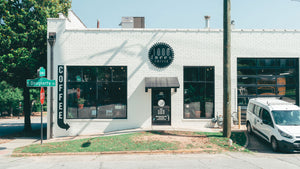Fugi Ikizere
In stock
Info
Back again for the sixth consecutive year, another stunning washed offering from Fugi! Coffees from this station, and more specifically the Ikizere project, have solidified themselves as some of our yearly favorites from Baho network and staples on our menu.
Located in the Southern Province of Rwanda, Fugi is nestled between the Nyungwe National Forest and the border of Burundi. The station was constructed in 2013, but it was purchased by Emmanuel in 2016. Since then, he’s dedicated Fugi to solely producing specialty grade coffee, and it was an integral part of the foundation upon which he launched the Baho Coffee operations. It’s the third smallest station in the Baho collection, purchasing cherries from approximately 950 smallholders in total.
For the past four years, we’ve focused our sourcing specifically on the Ikizere group that was formed in 2020. Meaning confidence in Kinyarwanda, Ikizere is Baho’s flagship initiative from their more traceable lot separation program. In short, the group is composed of widowed women and single mothers who share the unique challenges of navigating traditionally patriarchal systems - both the Rwandese society as a whole and more specifically coffee production. Through year-after-year support of the Fugi Ikizere group, we hope to help push Baho’s visions forward - developing a stronger sense of community between the women and creating a platform upon which their voices can be heard.
Over the past few years, we’ve seen the Ikizere project grow quickly from just around 20 growers at the Fugi station to now 100+ women with representation at each station that our importing partner, Sundog Trading, works with. Baho is heavily investing in support for this group via access to financial education, providing short term loans, and establishing clean water lines in specific communities. Emmanuel plays an active role here by arranging meetings each season to discuss their needs beyond coffee. Nonetheless, because of the success of the program, they’re all making significant improvements to their farms and investing in growing their operations. In addition to planting new coffee seedlings, many are strategically planting shade trees and using compost fertilizers as well.
Fugi Ikizere is structured, complex, and incredibly sweet - just as we’ve come to expect from all of the washed offerings that we purchase from Baho. This coffee presents a harmonious balance between a darker, saturated sweetness and a bright, lively acidity. We’re always impressed with the flavor characteristics that the more manual washed processing method produces (read more about this in the processing section). It’s no surprise that Fugi Ikizere has firmly established itself as a perennial favorite around here! We’re tasting: nectarine, clementine, blood orange, cherry limeade, dark honey, sugarcane, gingerbread, root beer, baking spices.
Relationship
This is our sixth consecutive year purchasing from Emmanuel Rusatira and his private exporting company, Baho Coffee. Our Director of Coffee formed his own company in 2019, Sundog Trading, and partnered with Emmanuel to begin importing coffees from Baho into North America. We’re excited to be early supporters of the project and can’t wait to see where this relationship takes us in the future.
After nearly 20 years of experience establishing and managing washing stations throughout Rwanda for a large export company, Emmanuel Rusatira and his family decided to branch out and start their own operations. Establishing Baho Coffee allowed him to freely focus his energy towards implementing his personal philosophies and pushing high quality protocols with his own privately owned stations. Emmanuel is impressively proactive with education and outreach. He works closely with producers year round - distributing seedlings, educating on proper growing and picking techniques, giving loans for infrastructure or quality of life investments, and generally being a positive force in the community and friend to all.
From Sundog Trading: The Rwanda coffee sector is unique in that it’s extremely small, which means that it’s possible for buyers to have a serious impact on the entire market. With an average annual export of between 267,000 - 400,000 bags, Rwandese coffee is a drop in the bucket of world coffee production. For context - Costa Rica, considered the smallest producer in Central America, produces 1.6 million bags annually, and Colombia produces 15 - 18 million annually. Coffee represents 25% of Rwanda’s total export economy, meaning that the government's efforts to make coffee a valuable sector for profit and employment generation has reaped huge benefits. The potential for impacting the overall economic well-being of the country is possible via coffee, but it must be optimized for that purpose. First and foremost, we believe that the profits must go to locals rather than major multinationals; and secondly, quality and prices must continue to increase.
We’re excited to be working with Baho Coffee for these very reasons. Emmanuel is one of a very small group of Rwandese people who are exporting their own coffee; this means that profits are remaining within the country and are being reinvested back into people. There is a deep level of commitment and respect between Emmanuel, his employees, and the farmers who deliver to Baho stations. Unlike many multinational companies, he is directly invested in the future of his own country. Working with and buying from Baho Coffee is meaningful to us in many ways; but at the heart of it all, we’re simply trying to support the Rwanda coffee sector by purchasing Rwandese coffee from Rwandese people. Through this, we’re able to serve as a transparent link connecting roasteries in North America to beautiful coffees from Rwanda.
Historically, coffee from the 950 farmers delivering to Fugi would have been grouped into large, station-level lots. Thanks to the increased traceability and smaller lot separations that Emmanuel has been able to establish, we’re thrilled to be able to publicly recognize the producers who grew the coffee that make up this offering. This is a first step in building a transparent and equitable relationship with groups of growers that we hope will deliver to Fugi for many years to come. Fugi Ikizere Washed is comprised of coffees grown, harvested, and processed by the following:
Kabega Sandrine
Mujawamariya Francine
Mukamuzima Costasie
Mukamurenzi Soline
Uwizeyimana Valida
Mukangenzi Xaverine
Ntawangaheza Epiphanie
Uwambajimana Theodosie
Sindikubwabo Vestine
Uwimana Josephine
Mukandemera Bernadette
Utarengejeho Christine
Baravuga Berancilla
Kabagwira Mariam
Mukamparirwa Verediane
Mukanyonga Angele
Nsaguye Venantie
Nyirantashya Speciose
Nyirarugwiro Drocelle
Nyandwi Christine
Mukamugema Alphonsine
Mukaremera Seraphine
Niyongere Marguerite
Mukakizima Venantie
Niyonizeye Veronique
Nyiraminani Cecile
Hategekimana Emerance
Mushimiyimana Dative
Bankundiye Fatma
Mukashyirangabo Providence
Dusingize Immaculee
Tegibanze Mariya
Nyirahabineza Jacqueline
Nyirahabimana Epiphanie
Ntakirutimana Donatha
Nyirabungurabwenge Christine
Dusabe Marie Grace
Mukakarangwa Donathille
Uwanyirigira Laurence
Mukeshimana Beatha
Mukamana Genevieve
Ntambabazi Appolinaire
Mukarubayiza Philomene
Mukangezahayo Philomene
Mukeshimana Florida
Mutagawa Venantie
Nyiransigiye Beatha
Nyiratabaro Odette
Nirora Donathe
Nyabyenda Beatha
Nsaguye Marie Goreth
Mukamugema Speciose
Uwitonze Clementine
Nyiransengima Valentine
Ahishakiye Clementine
Kwitegetse Costasie
Mukambuguje Clementine
Uwimana M Claire
Mukakibibi Appolinarie
Nyiracumi Adidja
Processing
In true Emmanuel fashion, he took the Ikizere vision as far as possible. Not only did he source coffee from a specific group of women, keep it isolated throughout the processing station, and pay them more than any other grower delivering to Fugi, he also asked them to sort and depulp their coffee together. His idea is to create a time and space for the group to connect, hopefully aiding in fostering lasting friendships between these women facing similar difficulties.
The Ikizere processing is particularly interesting because of an additional bulk fermentation step that happens prior to the depulping. Selected cherries are left to ferment, submerged in water, for 10 hours. After this fermentation period, when the fruit has started to soften, the coffee is manually depulped by simply pressing on the cherries by hand to expel the seeds.
While depulping by hand may sound incredibly time consuming and difficult (it definitely is), this is actually a traditional method of coffee processing in Rwanda. Prior to the development of washing stations, and even to some extent now, many producers would manually depulp their coffee and sell it in this wet state to intermediary buyers. This coffee would be marketed as semi washed, and often was of lower quality due to the poor processing procedures. We were admittedly a bit skeptical of the quality of these coffees when Emmanuel explained his plan to us. However, it was a very pleasant surprise to see that the rigorous quality control methods established within Fugi resulted in super delicious coffees.
After manual depulping, the wet parchment undergoes a dry fermentation for 18 hours before moving to the grading channels. Here the coffee is rigorously washed to remove any remaining mucilage and separated by density - with the highest density lots being reserved for our selections.
The washed Ikizere lot was dried in a parabolic drying structure that was built at Fugi during the 2020 season. Within this greenhouse, coffees are completely protected from rain and harsh, direct sunlight. Parchment is turned frequently and temperature is closely monitored throughout the day. Total drying time for this lot was 40 days.
Brewing
This coffee extracts rather easily and there’s a lot of complex flavors available to play with. You’ll want to use a relatively coarse grind size for brewing, as this will help keep the coffee tasting bright, clean, and transparent. Fugi has the ability to present itself similar to a washed Ethiopia, with a silky body and soft stone fruit flavors. As you tighten the grind size, you’ll find that the flavors, sweetness, and body of the coffee all intensify, presenting what we think to be the ideal flavor profile - juicier flavors like plum, orange, lime, and sugarcane.
If your coffee tastes thin, sour, and lacking sweetness - like an under ripe plum - try grinding finer.
If your coffee tastes cloying, intense, and bitter - like over steeped black tea - try grinding coarser.





















